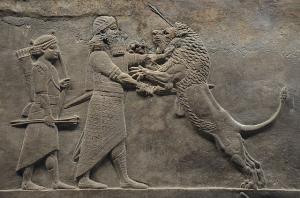The late Steve Hays was a Protestant Reformed, anti-Catholic apologist, very active online, who ran the site, Triablogue. In this series of articles, I will be critiquing many portions of a collection of his entitled “Annotated prooftexts [for Calvinism]” (7-7-14). Hays writes in his introductory section:
I’m going to quote a number of Reformed prooftexts, in canonical order, then quote interpretive comments by various scholars. . . . Taken by themselves, Reformed prooftexts might seem to beg the question by presupposing a Reformed interpretation thereof. . . . I’ve gone beyond bare prooftexting to provide exegetical arguments for the Reformed interpretation. . . .
Although both Calvinists and Arminians have their one-verse prooftexts, Reformed theological method is based less on snappy one-liners than tracing out the flow of argument or narrative arc in larger blocks of Scripture (e.g. Gen 37-50; Exod 4-14; Isa 40-48; Jn 6, 10-12, 17; Rom 9-11; Eph 1-2, 4).
Hays utilizes the English Standard Version (ESV) of the Bible, which was produced by over one hundred evangelical Protestant scholars, and follows the literary tradition of the KJV and especially the RSV. When I cite additional Scripture in my replies, it will be the RSV version.
*****
24 The Lord of hosts has sworn:
“As I have planned,
so shall it be,
and as I have purposed,
so shall it stand,
25 that I will break the Assyrian in my land,
and on my mountains trample him underfoot;
and his yoke shall depart from them,
and his burden from their shoulder.”
26 This is the purpose that is purposed
concerning the whole earth,
and this is the hand that is stretched out
over all the nations.
27 For the Lord of hosts has purposed,
and who will annul it?
His hand is stretched out,
and who will turn it back?When God swears to do something, the listener can be fully assured that it will happen. God’s holiness guarantees the execution of his plans, for he stakes his holy reputation on his promises (cf. similar holy oaths in Amos 4:2; 6:8; 8:7).
The claim is made that there is a direct connection between God’s plans and purposes and what actually will happen…This contrasts with man’s inability to carry out his plans (8:10; cf. 46:10; Ps 33:9-11; Prov 19:21).
The final two verses extrapolate the principles in 14:24-25 and apply them to God’s plans for the whole world…the comparison suggests that God makes sovereign plans not only for specific events related to the future of Assyria, but also for every nation on earth…There is no other way for things to happen in this world, no second choices, no alternative plans but God’s plans. No one can resist the hand of God, and no one can turn God’s hand away from doing his will. G. Smith, Isaiah 1-39 (B&H 2007), 320-22.
Sometimes in Isaiah a divine statement is underlined in some particularly emphatic way (cf. 5:9; 9:7; 37:32), and so it is here. The name of God is used here (cf. comment on 1:9) combines with the statement of his settled purpose (c f. 5:19) to assure us that the Assyrians cannot survive. If such a mighty God has designed to crush them, they are doomed indeed. As though to reinforce this certainty still more, God speaks of “my land” and “my mountains.”
The prophetic word here enunciates an important general principle that has been demonstrated so strikingly in the downfall of Assyria: God is sovereign over human history (v26). All nations will have to submit to his judgment. This important theological principle will be seen in relation to other nations-both small and great-in the oracles that follow. God is not like a man who makes plans and finds he has no power to put them into effect. Perfect wisdom and absolute power find their unity in god. REBC 6:568-69.
Remarkably, what is missing in all this analysis is why God judged Assyria. And this is missing because Calvinists always seem to want to ignore the reasons why God judges: always because of man’s rebellion against Him. Instead, we get boilerplate Calvinist rhetoric: “There is no other way for things to happen in this world, no second choices, no alternative plans but God’s plans. No one can resist the hand of God, and no one can turn God’s hand away from doing his will.” This is nonsense. Jesus is God, and He expressly said that He wanted Jerusalem to come to Him, but that they “would not”:
Matthew 23:37 “O Jerusalem, Jerusalem, killing the prophets and stoning those who are sent to you! How often would I have gathered your children together as a hen gathers her brood under her wings, and you would not!” (cf. Lk 13:34)
God honors our free will choices, even if they go against His will and what is best for us. God doesn’t want / desire / will any human being to be damned and lost for eternity:
1 Timothy 2:3-4 . . . God our Savior, [4] who desires all men to be saved and to come to the knowledge of the truth.
2 Peter 3:9 The Lord is not slow about his promise as some count slowness, but is forbearing toward you, not wishing that any should perish, but that all should reach repentance.
So how is it, then, if in fact “No one can resist the hand of God” and no one can thwart God’s will, that many people indeed are damned and end up in hell?:
Matthew 25:32, 46 Before him will be gathered all the nations, and he will separate them one from another as a shepherd separates the sheep from the goats, . . . [46] And they [the “goats”] will go away into eternal punishment, but the righteous into eternal life. [and the context reveals that the damned are damned because they didn’t do a long list of things that they should have done]
Matthew 7:13-14, 18-19 “Enter by the narrow gate; for the gate is wide and the way is easy, that leads to destruction, and those who enter by it are many. [14] For the gate is narrow and the way is hard, that leads to life, and those who find it are few. . . . [18] A sound tree cannot bear evil fruit, nor can a bad tree bear good fruit. [19] Every tree that does not bear good fruit is cut down and thrown into the fire.”
Mark 16:16 He who believes and is baptized will be saved; but he who does not believe will be condemned.
2 Thessalonians 2:9-12 The coming of the lawless one by the activity of Satan will be with all power and with pretended signs and wonders, [10] and with all wicked deception for those who are to perish, because they refused to love the truth and so be saved. [11] Therefore God sends upon them a strong delusion, to make them believe what is false, [12] so that all may be condemned who did not believe the truth but had pleasure in unrighteousness.
Note the order of causation here. Satan comes to deceive those who “refused to love the truth and so be saved” and God sends them a delusion precisely because they “did not believe the truth but had pleasure in unrighteousness.” God didn’t predestine damnation, as if man’s free will is nonexistent. He responded with judgment towards the free will choices of men to rebel against Him and His grace and salvation.
Revelation 20:13-15 And the sea gave up the dead in it, Death and Hades gave up the dead in them, and all were judged by what they had done. [14] Then Death and Hades were thrown into the lake of fire. This is the second death, the lake of fire; [15] and if any one’s name was not found written in the book of life, he was thrown into the lake of fire.
It’s the same with the Assyrians. They were judged by God based on what they did. They chose to be wicked and to not come to God (though God reached out to them through, for example, the prophet Jonah). In the end, Assyria was judged, not because God had that planned for all eternity, so that nothing it did could change it, but because of rebellion and wickedness: especially against God’s chosen people.
The article, “Why did God judge Nineveh so harshly in the book of Nahum?” (Got Questions), observed:
God was obviously angry with the Ninevites, and Nahum reveals why. Nineveh had long been an enemy of Judah and Israel, the people of God. In 722 B.C., the Assyrians defeated the northern kingdom of Israel, destroying its capital, Samaria. In 701 B.C., the Assyrians nearly conquered Jerusalem, the capital of Judah.
The text of Nahum provides additional clues regarding God’s anger with the Ninevites. Nahum 3:1 says, “Woe to the city of blood, full of lies, full of plunder, never without victims!” Nineveh was a city of violence, known for its brutal treatment of those it conquered. The Assyrians were notorious for amputating hands and feet, gouging eyes, and skinning and impaling their captives. The final verse of Nahum’s book emphasizes the violence of the Assyrians in the form of a rhetorical question: “Who has not felt your endless cruelty?” (Nahum 3:19).
Holy Scripture makes all this clear:
Isaiah 10:1-2, 5-7, 12-14 Woe to those who decree iniquitous decrees, and the writers who keep writing oppression, [2] to turn aside the needy from justice and to rob the poor of my people of their right, that widows may be their spoil, and that they may make the fatherless their prey! . . . [5] Ah, Assyria, the rod of my anger, the staff of my fury! [6] Against a godless nation I send him, and against the people of my wrath I command him, to take spoil and seize plunder, and to tread them down like the mire of the streets. [7] But he does not so intend, and his mind does not so think; but it is in his mind to destroy, and to cut off nations not a few; . . . [12] When the Lord has finished all his work on Mount Zion and on Jerusalem he will punish the arrogant boasting of the king of Assyria and his haughty pride. [13] For he says: “By the strength of my hand I have done it, and by my wisdom, for I have understanding; I have removed the boundaries of peoples, and have plundered their treasures; like a bull I have brought down those who sat on thrones. [14] My hand has found like a nest the wealth of the peoples; and as men gather eggs that have been forsaken so I have gathered all the earth; and there was none that moved a wing, or opened the mouth, or chirped.”
Isaiah 10:24-25 Therefore thus says the Lord, the LORD of hosts: “O my people, who dwell in Zion, be not afraid of the Assyrians when they smite with the rod and lift up their staff against you as the Egyptians did. [25] For in a very little while my indignation will come to an end, and my anger will be directed to their destruction.”
Jeremiah 50:17-18 Israel is a hunted sheep driven away by lions. First the king of Assyria devoured him, and now at last Nebuchadrez’zar king of Babylon has gnawed his bones. [18] Therefore, thus says the LORD of hosts, the God of Israel: Behold, I am bringing punishment on the king of Babylon and his land, as I punished the king of Assyria.
God explains through the prophets Isaiah and Jeremiah exactly why Assyria was judged. Israel was repeatedly judged by God but then restored again, whereas the Assyrian empire, after conquering the northern kingdom of Israel in 722 BC, disappeared from history in 612 BC when its capitol Nineveh fell to a coalition of enemies including the Babylonians, Medes, Persians, and Scythians.
Likewise, in 539 BC, Babylon fell to Cyrus the Great, the king of Persia. It was judged by God because it had destroyed Jerusalem in 586 BC. In both cases, these empires were judged based on what they did by their own free will: not because God had decreed that they should be wicked from all eternity, as a bunch of robots with no free will to follow God or reject Him. The Bible makes this clear as regards Babylon, too:
Jeremiah 51:1-5 Thus says the LORD: “Behold, I will stir up the spirit of a destroyer against Babylon, against the inhabitants of Chalde’a; [2] and I will send to Babylon winnowers, and they shall winnow her, and they shall empty her land, when they come against her from every side on the day of trouble. [3] Let not the archer bend his bow, and let him not stand up in his coat of mail. Spare not her young men; utterly destroy all her host. [4] They shall fall down slain in the land of the Chalde’ans, and wounded in her streets. [5] For Israel and Judah have not been forsaken by their God, the LORD of hosts; but the land of the Chalde’ans is full of guilt against the Holy One of Israel.
Jeremiah 51:11 The LORD has stirred up the spirit of the kings of the Medes, because his purpose concerning Babylon is to destroy it, for that is the vengeance of the LORD, the vengeance for his temple.
Jeremiah 51:24 “I will requite Babylon and all the inhabitants of Chalde’a before your very eyes for all the evil that they have done in Zion, says the LORD.”
Jeremiah 51:49 Babylon must fall for the slain of Israel, . . .
***
*
***
Photo credit: Carole Raddato (2-20-15). Sculpted reliefs depicting Ashurbanipal, the last great Assyrian king, hunting lions, c. 645-635 BC, now in the British Museum [Wikimedia Commons / Creative Commons Attribution-Share Alike 2.0 Generic license]
***
Summary: Calvinists claim that the judgment of Assyria was predetermined from all eternity by God, as if the Assyrians had no free will in how to act. False nonsense!














